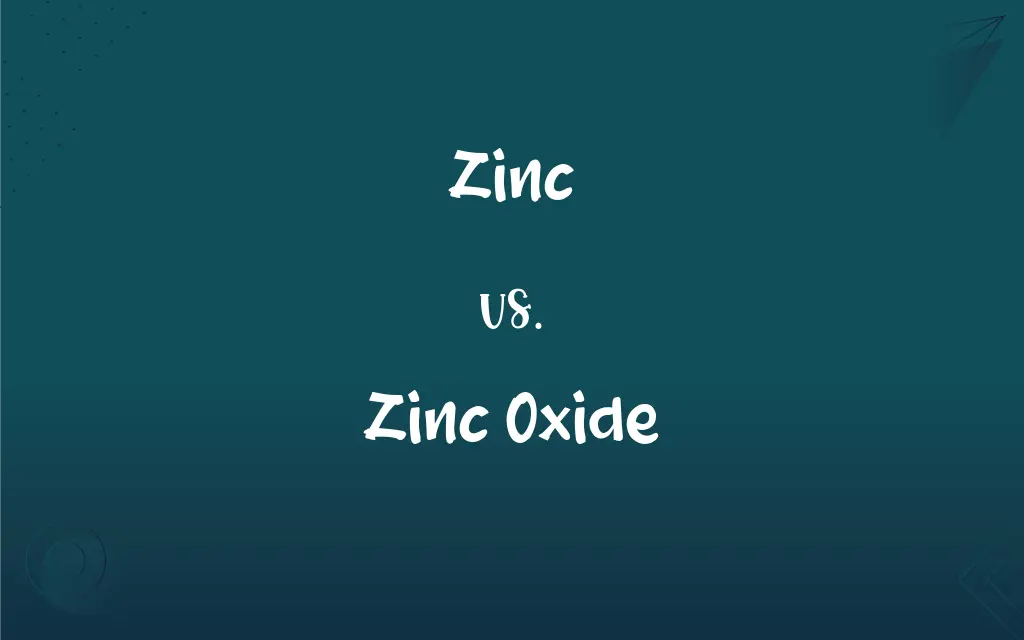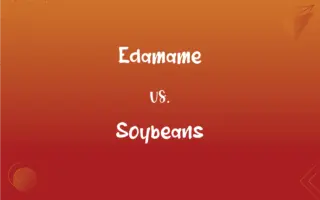Zinc vs. Zinc Oxide: What's the Difference?
Edited by Aimie Carlson || By Janet White || Published on December 31, 2023
Zinc is a metallic element, while zinc oxide is a chemical compound made of zinc and oxygen.

Key Differences
Zinc is a natural metallic element, known as a transition metal, crucial in many biological processes. On the other hand, zinc oxide is a compound formed when zinc is chemically combined with oxygen.
Zinc is used in its metallic form for various industrial applications, including galvanization. Zinc oxide, however, is widely used in products like sunscreens and ointments due to its protective properties.
In its pure form, zinc is a bluish-silver metal, known for its corrosion-resistant properties. Zinc oxide appears as a white powder and is used for its sun-blocking and skin-protecting abilities.
Zinc is an essential dietary mineral important for immune function and enzyme reactions. Zinc oxide is not ingested for dietary benefits but is used topically for skin protection and care.
In the environment, zinc occurs naturally in ores, while zinc oxide is synthesized for commercial use and is not found naturally.
ADVERTISEMENT
Comparison Chart
Nature
Metallic element
Chemical compound
Appearance
Bluish-silver metal
White powder
Uses
Galvanization, alloys, batteries
Sunscreens, skin ointments, rubber
Role in Health
Dietary mineral for immune system
Topical use for skin protection
Occurrence
Naturally in ores
Synthesized industrially
ADVERTISEMENT
Zinc and Zinc Oxide Definitions
Zinc
An essential mineral important for human health.
Zinc supplements are taken to boost the immune system.
Zinc Oxide
A compound used in skin ointments for its soothing effect.
Zinc oxide ointment is effective for diaper rash.
Zinc
A transition metal with corrosion-resistant properties.
Zinc is often alloyed with copper to make brass.
Zinc Oxide
A white, powdery compound with sun-protective properties.
Zinc oxide is a primary ingredient in mineral sunscreens.
Zinc
A metallic element with the symbol Zn.
Zinc is used to galvanize steel to prevent rust.
Zinc Oxide
A chemical compound used in paint pigments.
Zinc oxide gives paints excellent coverage properties.
Zinc
A metal used in various industrial and chemical processes.
Zinc is integral in the process of die-casting.
Zinc Oxide
An inorganic compound with antiseptic qualities.
Zinc oxide is used in creams for minor skin irritations.
Zinc
An element used in making batteries and other electronics.
Zinc is a key component in alkaline batteries.
Zinc Oxide
Used in the manufacturing of rubber and plastics.
Zinc oxide helps improve the strength of rubber tires.
Zinc
A bluish-white, lustrous metallic element that is brittle at room temperature but malleable with heating. It is used to form a wide variety of alloys including brass, bronze, various solders, and nickel silver, in galvanizing iron and other metals, for electric fuses, anodes, meter cases and batteries, and in roofing, gutters, and various household objects. US pennies minted after 1982 consist of a copper-clad zinc core. Atomic number 30; atomic weight 65.38; melting point 419.53°C; boiling point 907°C; specific gravity 7.134 (at 25°C); valence 2. See Periodic Table.
Zinc
To coat or treat with zinc; galvanize.
FAQs
What is zinc oxide?
Zinc oxide is a chemical compound made by combining zinc and oxygen, used mainly in skin care products.
Can zinc oxide be used in electronics?
Zinc oxide has limited use in electronics, unlike zinc, which is widely used in batteries and metalworking.
What is zinc?
Zinc is a chemical element, a metal found naturally in the environment and used in various industries.
How does zinc benefit the body?
Zinc aids in immune function, wound healing, and DNA synthesis in the body.
Can zinc oxide be ingested?
Zinc oxide is not typically ingested but used topically; ingesting large amounts can be harmful.
Is zinc oxide safe for skin?
Yes, zinc oxide is considered safe and effective for skin, often used in sunscreens and ointments.
Can zinc be toxic?
High levels of zinc can be toxic, so it must be consumed in moderation.
How is zinc oxide produced?
Zinc oxide is produced by chemically heating zinc metal in the presence of oxygen.
Are zinc and zinc oxide found naturally?
Zinc is found in nature as a metal, while zinc oxide is not naturally occurring but synthesized.
Is zinc essential for human health?
Yes, zinc is an essential mineral for the human body, crucial for immune function and metabolism.
How is zinc extracted?
Zinc is typically extracted from zinc ores like sphalerite through mining and smelting processes.
Does the body produce zinc?
The human body does not produce zinc; it must be obtained from diet or supplements.
Where is zinc oxide commonly used?
Zinc oxide is used in sunscreens, skin creams, and as a pigment in paints.
Can zinc oxide cause allergies?
Zinc oxide is usually hypoallergenic, though some people might have a rare sensitivity to it.
What are the signs of zinc deficiency?
Zinc deficiency can lead to weakened immune response, hair loss, and delayed wound healing.
Can zinc oxide block UV rays?
Yes, zinc oxide is an effective physical barrier against both UVA and UVB rays.
Are zinc and zinc oxide recyclable?
Zinc can be recycled, while zinc oxide's recyclability depends on its form and use.
What products commonly contain zinc?
Zinc is found in galvanized metals, alloys, and dietary supplements.
Is zinc oxide environmentally friendly?
Zinc oxide is generally considered environmentally safe, especially in its applications in sunscreens and skincare.
How does zinc impact the environment?
Zinc can be harmful in large quantities, but it is generally less toxic than other metals.
About Author
Written by
Janet WhiteJanet White has been an esteemed writer and blogger for Difference Wiki. Holding a Master's degree in Science and Medical Journalism from the prestigious Boston University, she has consistently demonstrated her expertise and passion for her field. When she's not immersed in her work, Janet relishes her time exercising, delving into a good book, and cherishing moments with friends and family.
Edited by
Aimie CarlsonAimie Carlson, holding a master's degree in English literature, is a fervent English language enthusiast. She lends her writing talents to Difference Wiki, a prominent website that specializes in comparisons, offering readers insightful analyses that both captivate and inform.































































